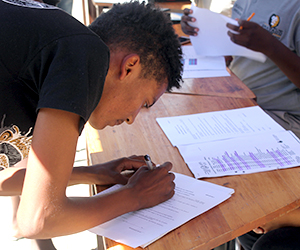
First-years moved into residences at the
Bloemfontein Campus of the University of
the Free State on 20 and 21 January 2017.
Photo: Rulanzen Martin
The Bloemfontein Campus of the University of the Free State was abuzz with excitement as first-year students arrived at their new homes and residences, brimming with enthusiasm at starting a new chapter in building towards a professional career.
Although there were some mixed emotions about leaving the nest, most students were excited about the times ahead as they moved into their residences on 20 and 21 January 2017.
Student life and building a career
“I am looking forward to a new adventure, to student life and living at university. Also to build my future here,” said Veruska van Schalkwyk, as her parents, who had driven all the way from Springbok in Northern Cape, helped her unpack at Harmony residence.
Veruska, who will be studying Nursing, said she loved TV programmes like
Grey's Anatomy. “Nursing has always been my passion and something I loved. I have always loved helping people.”
University provides a prosperous future
For Okuhle Gubevu, who will also be a first-year in Harmony, the UFS is the ideal place to further her career. “Out of all the research I have done, the University of the Free State is the one university that has a prosperous future for me in my ventures to become an accountant,” she said. “Because of that and because it is not too far from home, I decided on the UFS.”
Mopeli Lebohang will be staying in Outeniqua residence and is keen to work hard. “I heard the course I am studying, B Accounting, is the third toughest course at the university,” he said. “I am excited, because I like challenges.”